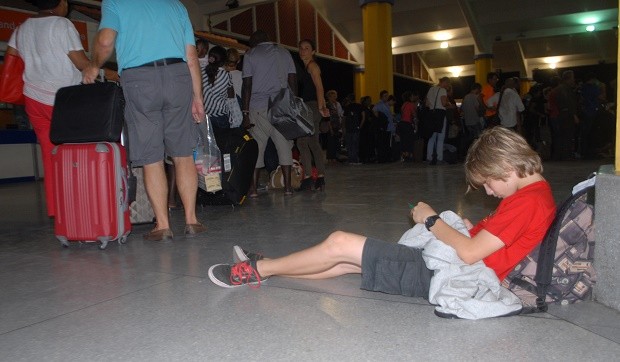
A child rests as passengers go through security screening at Moi International Airport Mombasa Kenya, Sunday, Dec. 20, 2015 after their earlier flight was involved in a bomb scare and they were evacuated to different hotels in Mombasa. AP
The crude combination of a kitchen timer, paper and cardboard found in a lavatory on an Air France flight could have been a bomb, but the crew didn’t tell passengers of that possibility. Instead, people were told the plane had a technical problem and would be landing in Kenya instead of Paris.
Sunday’s decision, which was short of the full truth, raises an ethical question about when passengers should be fully informed of problems in the air. But many experts say the crew of Air France Flight 463 did the right thing, avoiding panic and quickly landing the plane. Once on the ground, security officials determined that the device was a hoax, and passengers were told the full story.
“We pay our captains to make good decisions and you’ve got to back them up,” said Robert Mann, a former airline executive who now is president of R.W. Mann & Company, Inc., an airline consulting firm in Port Washington, New York. “In this case I think the crew made a really rational decision.”
READ: Air France: Suspicious device on flight was a hoax
He said the crew had no evidence that the device was an actual bomb, so telling passengers there was a technical problem was true “in the sense that they don’t know what they have.”
The Boeing 777, originally headed to Paris from the island of Mauritius, was diverted to Kenya’s coastal city of Mombasa. Hundreds of passengers left the plane on emergency slides. Afterward, several praised the flight crew for keeping everyone calm.
Most airlines don’t have hard-and-fast policies on what to tell passengers, leaving that up to the crew, according to Alan Price, a former chief pilot for Delta Air Lines and founder of consulting firm Falcon Leadership.
But experts say airlines should be thinking more about what to do in an era of increasing security threats and hoaxes. For Air France, this was the fourth bomb hoax in recent weeks.
Crew members also have to weigh how much passengers can find out from other sources as more planes come equipped with Internet and television access.
In 2005 a JetBlue flight that circled Los Angeles with a malfunctioning landing gear was captured by television cameras, and passengers picked up the live broadcasts on the plane’s cabin monitors. Price said he would have told passengers of that problem and reassured them. They also would have seen emergency equipment waiting on the tarmac, he said.
But Price agreed with the Air France crew. Telling passengers, he said, “would really create unnecessary problems. And what could they do about it anyway?”
Paul Hudson, president of Flyersrights.org, a passenger advocate group, also agreed.
“You don’t want them to panic while it’s in the air,” he said. “But obviously when it’s on the ground, you should be telling them the truth.”
READ: Air France flight forced to land in Kenya over bomb scare